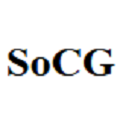计算机理论 | SoCG 2019等国际会议信息5条
计算机科学理论
SoCG 2019
ACM Symposium on Computational Geometry
全文截稿: 2018-12-05
开会时间: 2019-06-18
会议难度: ★★★★★
CCF分类: B类
会议地点: Portland, OR, USA
网址:http://eecs.oregonstate.edu/socg19/index.html
The Computational Geometry Week (CG Week 2019) is the premier international forum for advances in computational geometry and its many applications. The next edition will take place in Portland, USA, June 18-21, 2019.
计算机科学理论
COMPUTATION TOOLS 2019
International Conference on Computational Logics, Algebras, Programming, Tools, and Benchmarking
全文截稿: 2018-12-22
开会时间: 2019-05-05
会议难度: ★★
CCF分类: 无
会议地点: Venice, Italy
网址:https://www.iaria.org/conferences2019/COMPUTATIONTOOLS19.html
COMPUTATION TOOLS 2019 conference tracks:
Trends on computation
Assertion-based analysis; Conditional transformation systems; Generalized learned constraints; Constraint propagation; Stable-unstable semantics; Abstract compilation; Semantic code browsing; Pointer analysis; Minimal entailment; Infinitary formulas; Static profiling of parametric resource usage; Rewriting optimization statements; Algebraic effect handlers; Non-ground rules; Resource-based answer set semantics; Local domain symmetry; Knowledge patterns; Knowledge representation; Grounded fixpoints; Supersafe rules; Qualitative spatio-temporal reasoning; Reasoning about truthfulness; Cause-effect relations; Higher-order logics; Models expansion; Optimal stable models; Intelligent instantiations; Answer set programming; Non-monotonic cause-effect relations; Paraconsistency; Active integrity constraints
Logics
Reasoning logics; Fuzzy logics; Semantic logics; Temporal logics; Emotion logics; Ambiant logics; Modal logics; Description logics; Computational tree logic; Computational logics and constraints; Quantum computational logics; Executable computational logics; Monadic computational logics; Many-valued computational logics; Computability logic
Algebras
Computational algebras; K-theories, C*-algebras, Index theory; Algebraic and topological K-theory; Geometric group theory and group C*-algebras; Noncommutative geometry and topology; Pseudodifferential operators on singular manifolds; Topological invariants of non-simply connected manifolds; Deformation quantization; Lambda calculus; Relation algebra; Algebras for symbolic computation; Constructive algebras
Advanced computation techniques
Machine learning; Fuzzy theory/computation/logic; (Artificial) neuronal networks; Distributed artificial intelligence; Genetic algorithms; Analytic tableaux; Autonomous agent-based techniques; Knowledge-based systems and automated reasoning; Logical issues in knowledge representation /non-monotonic reasoning/belief; Dempster-Shafer theory; Concurrent computation and planning; Deduction and reasoning
Specialized programming languages
Logic programming; Specialized computation languages; Real-time computation languages; Embedded-computing languages; Programming semantics; Content-driven programming; Multimedia-oriented programming; Context-driven programming; Service-oriented programming; Pattern-oriented programming; Regenerative programming; Progressive programming; Sensing-oriented programming; Mobile-ubiquity-oriented computing; Compilation issues
Tools for distributed computation
Platforms for distributed computing; Specification and verification of programs and systems; Techniques for cloud computing; On-request resource allocation mechanisms; Security and privacy techniques; Computational benchmarking metrics, criteria and methodologies; Distributed debug and on-fly repairing; Inference of schemas, integrity constraints in computational applications; Real-world applications, experiments, projects
计算机科学理论
PADS 2019
ACM SIGSIM Conference on Principles of Advanced Discrete Simulation
全文截稿: 2019-01-07
开会时间: 2019-06-03
会议难度: ★★★
CCF分类: 无
会议地点: Chicago, Illinois, USA
网址:http://www.acm-sigsim-pads.org
The 2019 ACM SIGSIM Conference on Principles of Advanced Discrete Simulation (ACM SIGSIM PADS) will take place at the Illinois Institute of Technology (IIT), on June 3-5, 2019 in Chicago, Illinois, USA.
The annual PADS conference has a long history dating back to 1985. The conference was formerly known under the name Principles of Advanced and Distributed Simulation, and before that simply Parallel and Distributed Simulation. Over the years PADS has broadened its scope beyond its origins in parallel and distributed simulation and now encompasses virtually all research that lies at the intersection of the computer science and the modeling and simulation fields. Specifically, many research topics not related to parallel or distributed model execution are now included.
SIGSIM PADS provides a unique forum for reporting and discussing research results and important topics of interest to the M&S community. SIGSIM PADS is the flagship conference of ACM's Special Interest Group on Simulation and Modeling (SIGSIM) and is fully sponsored by that organization.
计算机科学理论
COCOON 2019
International Computing and Combinatorics Conference
全文截稿: 2019-03-19
开会时间: 2019-07-29
会议难度: ★★
CCF分类: 无
会议地点: Xian, China
网址:http://ictt.xidian.edu.cn/COCOON2019/index.html
All the papers will be published to the symposium in Springer-Verlag's Lecture Notes in Computer Science. Papers of high quality will be invited to special issues of Algorithmica, Theoretical Computer Science (TCS), and Journal of Combinatorial Optimization (JOCO), respectively.
The topics of interest include (but are not limited to) the following:
Algorithms and Data Structures
Algorithmic Game Theory
Approximation Algorithms and Online Algorithms
Automata, Languages, Logic, and Computability
Complexity Theory
Computational Learning Theory and Knowledge Discovery
Cryptography, Reliability and Security, and Database Theory
Computational Biology and Bioinformatics
Computational Algebra, Geometry, and Number Theory
Graph Drawing and Information Visualization
Graph Theory, Communication Networks, and Optimization
Parallel and Distributed Computing
计算机科学理论
FCT 2019
International Symposium on Fundamentals of Computation Theory
全文截稿: 2019-04-07
开会时间: 2019-08-11
会议难度: ★★
CCF分类: 无
会议地点: University of Copenhagen, Denmark
网址:https://di.ku.dk/fct2019/
The Symposium on Fundamentals of Computation Theory was established in 1977 for researchers interested in all aspects of theoretical computer science, and in particular in algorithms, complexity, formal and logical methods. It is held as a biennial series of conferences.
FCT 2019 will take place in Copenhagen, the capital of Denmark, at one of the oldest universities in Europe: University of Copenhagen.
下载Call4Papers App,获取更多详细内容!


登录查看更多
相关内容
Arxiv
3+阅读 · 2018年1月23日



